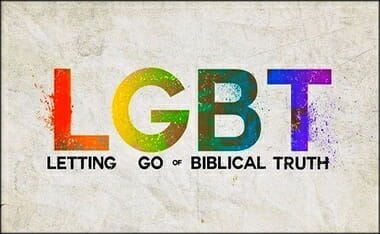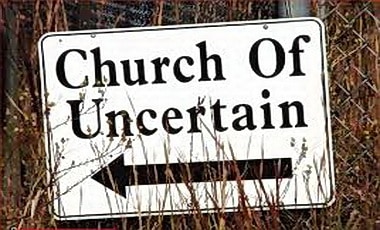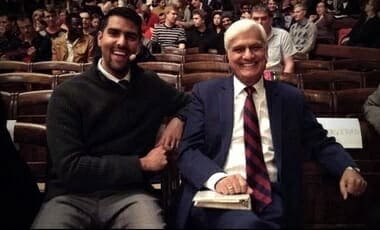This was originally posted in January of 2009 on my old blog. The debate took place in August of 2007. I am combining my parts ONE and TWO as Blogspot [at the time] had a cut off on the length of the post.
PART ONE:
PAPA GIORGIO SAID…
What a wonderful Hadith verse… however, if you accept that, you should also accept this:
Hadith from Bukhari, vol. 7, # 715, that details Islamic wife beating:
“Narrated Ikrima: ‘Rifaa divorced his wife whereupon Abdur-Rahman married her. Aisha said that the lady came wearing a green veil and complained to her (Aisha) and showed her a green spot on her skin caused by beating. It was the habit of ladies to support each other, so when Allah’s messenger came, Aisha said, “I have not seen any woman suffering as much as the believing women. Look! Her skin is greener than her clothes! When Abdur-Rahman heard that his wife had gone to the prophet, he came with his two sons from another wife. She said, “By Allah! I have done no wrong to him, but he is impotent and is as useless to me as this,” holding and showing the fringe of her garment. Abdur-Rahman said, “By Allah, O Allah’s messenger! She has told a lie. I am very strong and can satisfy her, but she is disobedient and wants to go back to Rifaa.” Allah’s messenger said to her, “If that is your intention, then know that it is unlawful for you to remarry Rifaa unless Abdur-Rahman has had sexual intercourse with you.” The prophet saw two boys with Abdur-Rahman and asked (him), “Are these your sons?” On that Abdur-Rahman said, “Yes.” The prophet said, “You claim what you claim (that he is impotent)? But by Allah, these boys resemble him as a crow resembles a crow.””
Also, book 009, Number 3512, 3526, and 3527 show that beating your wife is legal.
Sahih Muslim #2127:
…When it was my turn for Allah’s Messenger to spend the night with me, he turned his side, put on his mantle and took off his shoes and placed them near his feet, and spread the corner of his shawl on his bed and then lay down till he thought that I had gone to sleep. He took hold of his mantle slowly and put on the shoes slowly, and opened the door and went out and then closed it lightly. I covered my head, put on my veil and tightened my waist wrapper, and then went out following his steps till he reached Baqi’. He stood there and he stood for a long time. He then lifted his hands three times, and then returned and I also returned. He hastened his steps and I also hastened my steps. He ran and I too ran. He came (to the house) and I also came (to the house). I, however, preceded him and I entered (the house), and as I lay down in the bed, he (the Holy Prophet) entered the (house), and said: Why is it, O ‘Aisha, that you are out of breath? I said: There is nothing. He said: Tell me or the Subtle and the Aware would inform me. I said: Messenger of Allah, may my father and mother be ransom for you, and then I told him (the whole story). He said: Was it the darkness (of your shadow) that I saw in front of me? I said: Yes. He struck me on the chest which caused me pain, and then said: Did you think that Allah and His Apostle would deal unjustly with you?…
Muhammad even beat women. When Peter struck the ear of the Roman Guard, Jesus healed it. Muhammad hit women and even was involved – personally – with the slitting of 900 throats. There are pictures of Jesus with children all around him, even telling his disciples they should be like them. There are no such renderings of Muhammad.
Muhammad personally murdered. He personally beat women. And he slept with very, very young girls and had many more wives than “Allah” would allow.
The Quran clearly states that Muhammad was a sinner (his own words), and that Jesus was sinless. Is Muhammad really the superior “prophet” to look to? Especially in light of Jesus clearly stating himself to be the creator of the space-time continuum… e.g., Jesus created and sustains the cosmos.
GODSDOG SAID…
hi Papa,
i would caution in putting full faith in all of the hadiths as many are of questionable source and interpretation for a muslim, only the koran is the revealed scripture, the hadiths are creations of man
i agree that much of the misogny and violence coming out of islam is due to emphasizing the hadiths over the koran also, i could reference interpretations that show muhammed to be the kindest and most gentle of men, but since he was commissioned by god (as many of the jewish prophets), we must be careful in judging based on third parties and hearsay i am a sikh, i earnestly try to show respect for all the spiritual traditions of the world
cheers
PAPA GIORGIO SAID…
Beating of the wife, a call to murder (“prescriptive,” whereas the passages in the Bible are histories, or “descriptive”), the relegation of non-Muslims to Dhimmitude (second-class citizens), and the fact that Muhammad is called a sinner in the Quran and Jesus is called sinless, are all in line with the Hadith.
Also, that caution against the Hadith, then, would caution me when others use quotes from it, either negative or positive. (Like your post.)
All this still does not change the fact that verses ascribed to a Jin were removed, nor does it deal with the historical fact that Muhammad slit the throats of young boys and men as well as other murderous acts in history. His marrying a 9-year old is another issue.
Jesus ministry stands in stark contrast to Muhammad’s, Godsdog.
GODSDOG SAID…
papa,
you are entitled to your view and i certainly cannot change it
please understand i am not comparing or contrasting jesus and muhammed…that is not the purpose of this blog
i have great love for the christ as well as the deepest respect for muhammed(pbuh), the sikh gurus hold a special place in my heart
as a sikh, i feel the lord in his infinite mercy has revealed to different people (even today) different paths to him
personally, i feel the best and easiest way is to humbly submit to the lord in your heart…this truth is indisputable and is verified by the bible…by the koran…by the torah…by the vedas…and by guru granth sahib
anger at and disrespect of other religions and their founders is an obstacle which must be removed from the path if one truly wishes to see clearly
there is truly only one judge
cheers
PAPA GIORGIO SAID…
Unfortunately, Godsdog, using the rules of logic (non-contradiction and excluded middle), your saying many paths lead to one is easily proven unwarranted by the mutually exclusive claims between these religions. Your main problem is when you say this: “as a sikh, i feel the lord in his infinite mercy has revealed to different people (even today) different paths to him.” This goes against Judaic thinking, Christian thinking, and Islamic thinking. You are here judging these religions are wrong and your opinion about them is right, and thus, I am wrong. You are self-refuting your claims in your post above.
One author put it this way:
I feel it a duty to bear my solemn testimony against the spirit of the day we live in, to warn men against its infection. It is not Atheism I fear so much, in the present times, as Pantheism. It is not the system which says nothing is true, so much as the system which says everything is true. It is not the system which says there is no Saviour, so much as the system which says there are many saviours, and many ways to peace! – It is the system which is so liberal, that it dares not say anything is false. It is the system which is so charitable, that it will allow everything to be true. It is the system which seems ready to honour others as well as our Lord Jesus Christ, to class them all together, and to think well of all. Confucius and Zoroaster, Socrates and Mahomet, the Indian Brahmins and the African devil-worshippers, Arius and Pelagius, Ignatius Loyola and Socinus – all are to be treated respectfully; none is to be condemned. It is the system which bids us smile complacently on all creeds and systems of religion. The Bible and the Koran, the Hindu Vedas and the Persian Zendavesta, the old wives’ fables of Rabbinical writers and the rubbish of Patristic traditions, the Racovian catechism and the Thirty-nine Articles, the revelations of Emanuel Swedenborg and the Book of Mormon of Joseph Smith – all, all are to be listened to: None is to be denounced as lies. It is the system which is so scrupulous about the feelings of others, that we are never to say they are wrong. It is the system which is so liberal that it calls a man a bigot, if he dares to say, “I know my views are right.” This is the system, this is the tone of feeling which I fear in this day, and this is the system which I desire emphatically to testify against and denounce.
Another author said:
The Achilles’ heel of the claim that all paths lead to the same destination is the problem of internal consistency. Each religious tradition makeqs truth-claims which contradict the truth-claims of other religious traditions. We will briefly examine three areas of disagreement.
(1.) The first area of contradiction regards the nature of the ultimate reality (such as God). One discovers there is a vast chasm between monotheistic religions (such as Judaism, Christianity and Islam), and pantheistic religions (such as Hinduism, Buddhism). Muslims claim that there is only one God, Allah, who created the universe from nothing. Some Hindus, on the other hand, believe not in a personal creator, but in Brahman, an impersonal absolute reality which permeates all things. Other Hindus believe that there are millions of deities (such as Brahma, Vishnu, Shiva, and Krishna) which are manifestations of Brahman.
(2.) A second area of contradiction relates to the fate of individuals at death. According to Islam, each of us will die once and then face judgement by Allah. Depending on Allah’s judgement we will spend eternity in heaven or hell. In contrast, many Hindus claim that we will live (and have already lived) many lives on earth. Hindus believe that the conditions of our past and future existence are determined by the cosmic laws of karma. Following death each of us is reincarnated into a different form (human, animal, etc.).
(3.) Each religious tradition also identifies a universal problem that afflicts humanity. This brings us to a third area of disagreement. Hindus, for example, claim that the universal problem is samsara. Samsara is an endless cycle of birth, death and rebirth (reincarnation) in which every person is trapped. Only through knowledge of one’s relationship to Brahman and religious devotion can this cycle be broken and moksha (release) experienced. Christianity, on the other hand, maintains that the universal problem facing every person is separation from the God. According to Christianity, each person has rebelled against God by violating his commands (what the Bible calls sin). Christianity insists that there is no human solution to this problem. Only through a relationship with Jesus Christ can this problem of separation from God be overcome. Christians believe that Jesus Christ paid our sin-penalty through his death on the cross in order that our relationship with God might be restored.
These conflicting claims about the nature of the Ultimate, the fate of individuals at death, as well as the universal problem facing humanity are only a few of the conflicting assertions made by different religious traditions. These conflicts render implausible the claim that “all paths lead to the same destination.” Perhaps the following will help illustrate why this is the case. Consider the following two statements:
—– Northwestern University won the Big Ten championship in football in 1995.
—– Northwestern University did not win the Big Ten championship in football in 1995.
It is obvious that both of the these statements cannot be correct at the same time. This self-evident truth is often referred to as the principle of “non-contradiction.” This principle has a significant implication for our investigation. Two contradictory assertions cannot both be correct. Thus, if two religions make truth-claims which contradict each other, they cannot both be right. For example, when Hindus claim that there are many Gods and Jews claim that there in only one God, one of them must be wrong . In addition, when Muslims claim that each person lives only once and then faces judgement and Hindus claim that each person lives many lives determined by the law of Karma, one of them must be wrong.
GODSDOG SAID…
thanks papa,
well reasoned and logical,
you are right and i am wrong
i will end with this…true god realization is not a function of reason or logic…it is primarily, perhaps only, a function of love and humility
cheers
PAPA GIORGIO SAID…
All I am pointing out is the following Godsdog:
“All truth is relative!” (Is that a relative truth?); “There are no absolutes!” (Are you absolutely sure?); “Its true for you but not for me!” (Is that statement true just for you, or is it for everyone?) In short, contrary beliefs are possible, but contrary truths are not possible.
It isn’t that I say you are right or wrong, it is that Logic is a universal law, like math is. When the Hindu says that nothing exists and that all is an illusion, but then builds a house using geometry, math, physics, and the like, he is throwing his own philosophy to the wayside and accepting the Theistic philosophy… whether he realizes it or not.
In fact, these laws are so universal that one cannot refute the Law of Contradiction without using it (thus undermining his purpose).
Jesus spoke differently than any other founder of a religion. I have already pointed out that the Quran speaks of this difference by calling Muhammad a sinner (Sura 40:55) but saying Jesus was sinless (Sura 3:46).
One author puts it thus:
I want to leave the reader with this thought by Robert Hume. In his book, The World’s Living Religions, he comments that there are three features of Christian faith that “cannot be paralleled anywhere among the religions of the world” [I can add here, the cults either]. These include the character of God as a loving Heavenly Father, the character of the founder of Christianity as the Son of God, and the work of the Holy Spirit. Further, he says:
“All of the nine founders of religion, with the exception of Jesus Christ, are reported in their respective sacred scriptures as having passed through a preliminary period of uncertainty, or of searching for religious light. All the founders of the non-Christian religions evinced inconsistencies in their personal character; some of them altered their practical policies under change of circumstances. Jesus Christ alone is reported as having had a consistent God-consciousness, a consistent character himself, and a consistent program for his religion” (p.285-286).
Jesus said He was God Almighty, not a way or a path. Jesus said He was the Way, the Path, the Light. He said He was the Creator of the space-time-continuum, and the Jews tried to stone him for saying it. (See John 8:58-59 for one example of the many.) You give lip service to Jesus, but do not give his own words credence.
Buddha, Confucius, Zoroaster, Muhammad, Charles Taze Russell, Joseph Smith, and all the guru’s and religious leaders who have misled the masses since have not all made the claim in such Theistic terms that they are the creator of life itself. Only Jesus.
I didn’t say it, nor did I infer it. Much like the laws of logic are separate truths unto themselves. So to are Jesus’ words.
In order to change their plain meaning one has to “add” something to them, another text or person’s opinion (like the Book of Mormon or Nanak’s interpretation). Remember, Jesus said that all those who came before him (Buddha, Confucius, and the like) were liars. I didn’t say it. Jesus did.
GODSDOG SAID…
sura 3:46 (of jesus)
[3:46] “He will speak to the people from the crib, as well as an adult; he will be one of the righteous.”
<<>>
in sura 3:51, jesus says:
[3:51] “GOD is my Lord and your Lord; you shall worship Him alone. This is the right path.”
<<>>
sura 3:55
3:55 (And remember) when Allah said: O Jesus! Lo! I am gathering thee and causing thee to ascend unto Me, and am cleansing thee of those who disbelieve and am setting those who follow thee above those who disbelieve until the Day of Resurrection. Then unto Me ye will (all) return, and I shall judge between you as to that wherein ye used to differ.
brother…let us agree to let the one lord god be the judge
amen
PAPA GIORGIO SAID…
Who are the others that are righteous? Jesus said in John 7:24 for us to “judge not according to the appearance, but judge righteous judgment.”
In Matthew 7:16a, Jesus says we will “know them by their fruits…”, this knowing requires judgment Godsdog. Religious pluralism. Like you posit, cannot know their fruits. I use what we know about the fruits of both Islam and Muhammad to judge that they are doctrines of death. Can you name one Islamic country where the Quran is law where a person is not killed for converting from Islam to Christianity? I know them by their fruits Godsdog.
1 Timothy 5:20 tells us to “rebuke” the sin of someone before other people. In order to rebuke someones sin we must judge that someone’s conduct.
In Luke 12:51, Jesus says that he brings division, not peace. This division is the fact that he claims to be our Creator, not the messenger for the Creator. This “absolute” divides people, such as ourselves Godsdog. (Have you read the Bible? I am curious, many who do not understand Jesus have not read the New Testament the whole way through. Have you?)
II Timothy 4:2 tells us that the word is for “reproving, rebuking, and exhorting, with all long suffering, and doctrine.” Doctrine is what I am talking about here.
And, Godsdog, do you discount Jesus calling Himself God? And if so, on what basis, or why. Is it that you feel the Scriptures have been changed? Is it that you do not realize whom and to what culture Jesus was speaking to? Is it because you have been told repeatedly by people who themselves haven’t read the Bible that Jesus isn’t who he said he was?
GODSDOG SAID…
papa,
i have read the bible (once cover to cover and still randomly read passages from it)
i guess, my understanding of it is a bit different than mainstream christians
was jesus god? yes
was he the one and only son of god? not in my understanding
when one become perfect like our father in heaven is perfect, the lord brings one so close to himself that there remains no distinction
the ability to become one with god is a wonderful gift given to the human soul, not even the angels have been bestowed this gift
al-hallaj also said “i am the truth” and was duly tortured and killed, many saints have realized the same reality
take care in the distance you assume between yourself and the lord…he is closer to you then your very breath and heartbeat
in the true name of the victorious
PAPA GIORGIO SAID…
When you see the Bible (specifically the New Testament) speak of the “Son of God,” you cannot interpret that with a 21st century meaning. You have to understand what that phrase meant to the 1st century Jew.
Al-hallaj may have said he was truth, but Jesus is the only one to prove that He was God Almighty (raising Himself from the grave)… again, the Creator of space and time. Al-hallaj is not the Creator of the space-time continuum. In other words, Jesus claimed to be God, not part of creation, but the progenitor of it. This is the clear understanding of Jesus’ words in light of the 1st century Jew.
I think this should wrap up this conversation. I will pop in here and there to discuss these important issues… but I must congratulate you for having more nerve than most to stay in the conversation and debate/discuss such issues. This is more than many others do. Even if you didn’t deal with the main topic, that is, who Jesus said He was, not who I or you say He is.
God Bless, Godsdog.
PART TWO:
PAPA GIORGIO SAID…
Do Sikhs believe in reincarnation?
GODSDOG SAID…
yes, sikhs believe in reincarnation
krishna, buddha, muhammed, nanak and all the perfected ones took innumerable bodily incarnations until they realized the one lord and attained to his infinite presence
accordingly, these perfect souls at times choose to take additional bodily incarnations in order to teach and set an example to their brethren
cheers
PAPA GIORGIO SAID…
Thanks,
You should consider reading my blogs on this:
By-the-by. You have just judged the Holy Scripture of Christians and Muslims. Why? Because they reject pantheism as a worldview. I am merely pointing this out because you seem to not want people to “judge,” yet you just did by saying one position is true which by logic says other positions are wrong.
GODSDOG SAID…
hi papa,
i look forward to reading your blog and will get back to you
btw, i am not “judging” the bible or the koran, simply stating my understanding of reincarnation as it applies to the prophets and saints of the world religions
whats all this in the bible about john being elijah come again?
as you know, belief in reincarnation was tolerated if not explicitly accepted by the early christian church until the nicene council
as for the koran:
“And you were dead, and He brought you back to life. And He shall cause you to die, and shall bring you back to life, and in the end shall gather you unto Himself.” (2:28).
cheers
[….]
papa,
i’ve read over the two links you listed and you make some very good points
now i’ll refrain from going point-counter point with you as we will be here for weeks…g
btw, i am not a pantheist and neither is sikhism…my posts here are my beliefs and understanding,
i’ve never intimated that mine is the only truth…but you have
so be it
cheers
[….]
papa,
question for you, if “jesus” is the only way to salvation and the lord wants us to realize this, why isn’t everyone born into a christian family? its not fair that some are born muslims or sikhs or hindus or buddhists and not able to hear christs message without bias…why is the heavenly father so unfair that he handicaps billions in the search for truth?
if there is only one way, why so many different types of flowers, trees, dogs etc., one kind of each would be sufficient, no?
cheers
cheers
PAPA GIORGIO SAID…
Godsdog,
Engaging as always I see. That’s a good thing. I want to tackle two quick things that if you wish we can talk about later. First, reincarnation is impossible outside of the pantheistic (or panantheistic) worldviews. I have studied comparative religious thought for about 20-years, and I can emphatically state that monotheism or atheism do not allow for the regression of the soul. That’s one, not two. Reincarnation was not accepted in the Christian community until Nicea. I have likewise studied the early church for almost as long as comparative religions… and I can likewise – emphatically state – that this is not the case. Usually people who believe this also believe the Bible was put together at Nicea, Jesus was elevated to God-Almighty, and the like. I would love to discuss these things more with you in the near future if you wish. However, since I love Scripture, we will start here… sorta.
Before we get into the Scripture you mentioned, and oft repeated one in New Age and Eastern thinking, I want to get some ground rules going, and these ground rules are exegesis and hermeneutics (I will post them on my site under “Science of Interpretation” – you should read it before going further). These rules have been around for 2,500-years. You should become acquainted with them as they will make your studying more fruitful. Okay, the Bible… what fun!
Matthew 17:12: (Jesus Words) “But I say to you that Elijah has come already, and they did not know him but did do to him whatever they wished. Likewise the Son of Man is also about to suffer at their hands.”
John and Elijah did not have the same being — they had the same function. Jesus was not teaching that John the Baptist was literally Elijah, but simply that he came “in the spirit and power of Elijah” (Luke 1:17).
Secondly, Jesus’ disciples understood that he was speaking about John the Baptist, since Elijah appeared on the Mount of Transfiguration (Matt 17:10-13). Since John had already lived and died by then, and since Elijah still had the same name and consciousness, Elijah had obviously not been reincarnated as John the Baptist.
Thirdly, Elijah does not fit the reincarnation model, for he did not die. He was taken to heaven like Enoch who did not see death (2 Kings 2:11; Hebrews 11:5). According to traditional reincarnation, one must first die before he can be reincarnated into another body.
And finally, this passage should be understood in the light of the clear teaching of Scripture opposing reincarnation. Hebrews 9:27, for example declares, “It is appointed for men to die once, and after this comes judgment” (John 9:2).
So, we have Scripture clearly stating that John the Baptist came in the “spirit and power”. Saying that when I send a lawyer to court to sign papers for me, he is going in my spirit and power is not saying the lawyer is me. Same concept. Also the Bible clearly mentions that we die once. These two verses define the limits of the other verse you quoted from. The Bible interprets the Bible Godsdog.
Rule of Definition.
Define the term or words being considered and then adhere to the defined meanings.
Rule of Usage.
Don’t add meaning to established words and terms. What was the common usage in the cultural and time period
when the passage was written?
Rule of Context.
Avoid using words out of context. Context must define terms and how words are used.
Rule of Historical background.
Don’t separate interpretation and historical investigation.
Rule of Logic.
Be certain that words as interpreted agree with the overall premise.
Rule of Precedent.
Use the known and commonly accepted meanings of words, not obscure meanings for which their is no precedent.
Rule of Unity.
Even though many documents may be used there must be a general unity among them.
Rule of Inference.
Base conclusions on what is already known and proven or can be reasonably implied from all known facts.
GODSDOG SAID…
papa,
thanks for the reply,
reincarnation is not a make or break issue for me personally, i don’t care if i’ve haven’t “lived” before or if i have to “come back” as long as i don’t forget the one lord
reincarnation does, however, make intuitive sense to me
although there are numerous references to reincarnation in sri guru granth sahib, sggs also states that this human body is extremely difficult to obtain and there is no guarantee when one will obtain one again
so we need to cherish this human life and follow the lords call to faith and righteousness and not assume we have innumerable human lives ahead of us to make amends
i feel there is a last day of judgement (as stated in the bible and koran) when this current cycle of the lords play comes to an end
on that day, if i am consigned to hell due to my beliefs or statements…so be it…i ask only that i do not forget the one…if this wish is granted, hell will be a paradise for me
cheers
PAPA GIORGIO SAID…
Okay Godsdog, track with me buddy… focus like a laser beam. The Quran and the Bible are theistic books. They have in mind a being that created even time itself.
Here, maybe that didn’t help, let me try this. The Biblical view of God and His action in the world and final judgment is neither that of Kismet, the fatalism of Islam, nor that of Karma, the deterministic cause-and-effect of Hinduism and Buddhism. The human actors always behave as if free in their choices and therefore responsible for them.
If you read that small paragraph above, you will see that reincarnation cannot stem from theism, and even within theism there are theological differences that preclude Allah (in Islamic thought) from even caring enough to Judge righteously.
So to the first point. The theistic God has personality, He grieves, feels pains when people decide to reject Him, and is even angered. The God that Sikhs and Buddhist, Taoists, Hindu’s and others speak of is merely a force. This God did not create the “time/space continuum,” but matter and the universe are eternal like this “Mind” is eternal. (There are deep philosophical problem to an actual infinite regress of events in history, but this is a discussion for another day.) Reincarnation, in fact, can only run in a pantheistic worldview.
And since we know that both the theistic God who is personal and creative cannot exist at the same time as a “Force” who is impersonal and not creative (even using “who” for this pantheistic “god” is wrong), then either there is judgment or there is not. Logically then, both gods (the pantheistic one and the theistic one) could both not exist, making atheism the answer. But in pantheistic thinking this “Force” has always “existed” alongside matter, or, nature. This then makes this “Force” susceptible to nature’s influences and laws. The Judeo-Christian specifically created nature and therefore nature’s laws. So He is above these laws and not subject to them in any way, shape, or form. (I might add that the laws of logic and order come out of God’s nature of Being.) The “Force” of reincarnation is subject to nature and human actions.
This conversation shouldn’t be about debate; this one should be about clarity of thought. I want you to walk away from this conversation learning new truths that you may not have considered in the past. Our world puts limitations on us — in that one cannot disavow logical applications of thought about certain issues. And reincarnation and pantheism are at odds with your personal talk of judgment and a God who is active and cares and is angered. Both concepts cannot be true, and if this is what Sikhs believe — that both concepts are true — then you can surmise on your own if this belief is true or not. It is not my opinion or yours… you can reason to the logical conclusion using principles outside of yourself that both you and I can tap into.
GODSDOG SAID…
thanks papa,
very impressed with your theological knowledge and thought processes
i would humbly submit, however, that you do not truly understand sikhism
the waheguru of sikhism is not a “force”, it is a personality and the timeless supreme being (akal purakh)
please read some of sukhmani sahib to at least get a better understanding of sikhism and its expounding of the one without a second, the most high lord
cheers
PAPA GIORGIO SAID…
I do not truly understand… like I do not truly understand the “prophet” of Allah, Muhammad.
I will read what you mentioned.
[….]
Realize Godsdog that Hindus teach that there is a “Mind” that is timeless. But this “Mind” is impersonal, and that all “personalities” are an illusion because this eternal “Mind” is not personal. In fact, this is why pantheists – those who believe in reincarnation – try to rise above personality by altered states of consciousness, as well as other techniques (some completely stop talking and engaging with loved ones – like in Tibet and in India for example).
Absorption into this “Mind” seems to be the goal of Eastern philosophy. They lose “themselves” in the infinite Mass/Mind… there is no “me” or “you” in Eastern thought. …
… …
Which, if true and believed by you, you are one mind arguing with another mind (mine) that no minds like ours exist. That is self-refuting. But, I will look into this even more. But I have read Nanak and others and feel I have a decent grasp on your philosophy, with areas that I need to grow in knowledge in of course.
GODSDOG SAID…
hi papa,
long time, no chat huh?
these are very subtle points you are bringing up
the drop merging in the ocean (becoming one with god) and other such metaphors are applicable to some extent
the impersonal Mind you refer to is the classic advaita vedanta, where the impersonal brahman is elevated beyond and is considered higher than the personal ishwara or lord
in sikh philosophy there are two simultaneous aspects of the one lord
nirgun – without attributes
sargun – with attributes
one aspect is not greater than the other, the lord is both simultaneously
if your question is does our individual personality remain after merging with the one lord…i believe it does, it is the ego (sense of separateness) that is lost
cheers
PAPA GIORGIO SAID…
A couple things, I just put two videos up on my site that I think you will enjoy watching… I just found them but they are similar in discussion matter.
and, I have a site that I think you would benefit from (I have read every article on this site… good stuff. Especially for the seeker), it is:
A COMPARATIVE ANALYSIS
OF THE MAJOR WORLD RELIGIONS
FROM A CHRISTIAN PERSPECTIVE
THE END















